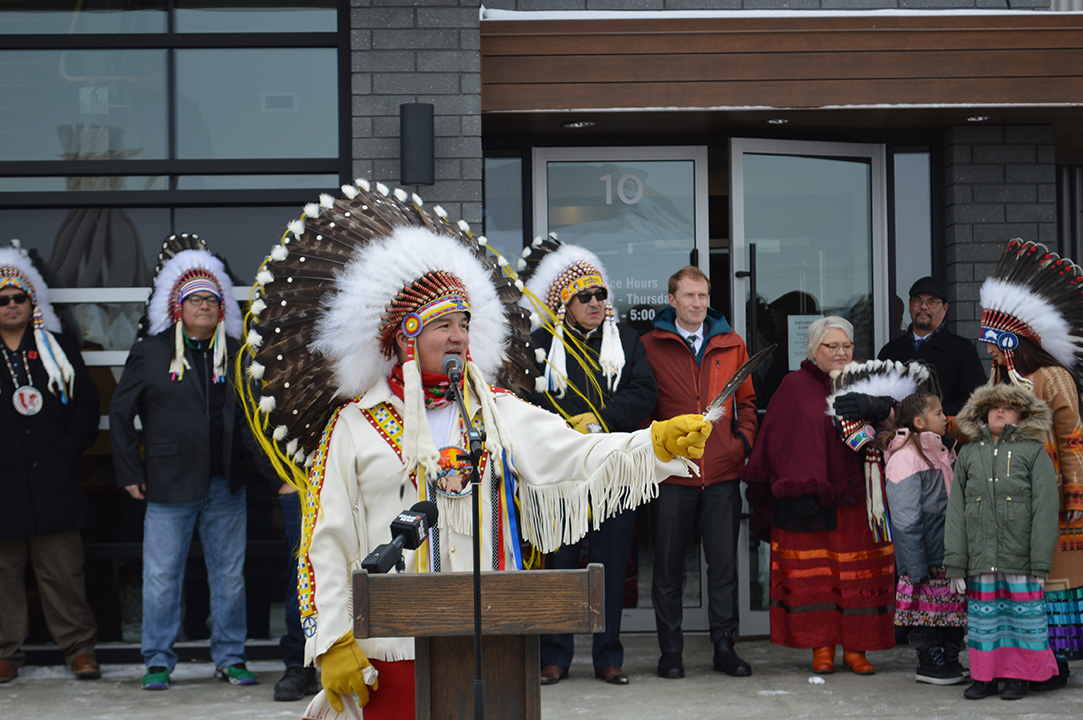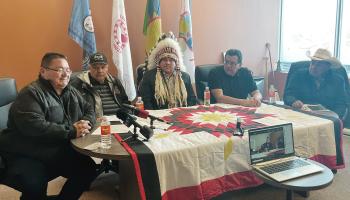Image Caption
Summary
Local Journalism Initiative Reporter
Windspeaker.com
Grand Chief Jerry Daniels of the Southern Chiefs’ Organization (SCO) doesn’t want Premier Heather Stefanson to speak for Manitoba First Nations next week on health care reform at the First Ministers meeting with Prime Minister Justin Trudeau.
“There is a treaty relationship that has been established long before (Stefanson) was ever premier or I was grand chief, and that has to lay the relationship. That has to be the foundation for how we proceed in an era of reconciliation. It has to be First Nations, Indigenous people…speaking for ourselves, and that’s got to be the future,” said Daniels.
Daniels was joined by chiefs Cornell McLean (Lake Manitoba), Kurvis Anderson (Pinaymootang), Glenn Hudson (Peguis), and Rod Traverse (Kinonjeoshtegon) at a news conference Jan. 30 in Winnipeg to demand a seat in Ottawa for the Feb. 7 meeting.
Trudeau is scheduled to host premiers in order to finalize a deal on healthcare funding for the provinces and territories. Separate bilateral deals are also expected.
“We have an impending crisis and we’re hearing it again and again. Every week it seems we’re hearing of citizens who are not being treated well, who are not receiving the care every Manitoban deserves,” said Daniels. “We hope that the premier and her team, and also federally with the prime minister, are listening to the concerns of First Nations here in Manitoba.”
“It’s getting worse now. It’s a life and death matter for many of our members,” said Anderson.
“I agree fully that our health care is substandard for our people and we can’t continue to live like that. We need to revamp our healthcare system as soon as possible,” said Traverse.
“Health is a treaty right and that’s something that our people should be provided equally, fairly and justly and also without any racism entering into the solutions, whatever they may be,” said Hudson.
The Federation of Sovereign Indigenous Nations (FSIN) in Saskatchewan is also calling for inclusion at the health table next week.

FSIN Chief Bobby Cameron stressed health is a treaty right under the Medicine Chest clause.
“To have (healthcare decisions) from a top-down approach, from federal government and provincial government, has failed and it will continue to fail because they keep excluding First Nation people at these tables,” Cameron told Windspeaker.com in an exclusive interview this morning.
He said First Nations’ advisors, leaders, knowledge keepers and technicians were the ones that had the answers and were the only ones who could adequately lobby for better access to health care for First Nations.
If he were at the table, Cameron said he could “continue to promote, implement, protect treaty as we see fit under the Medicine Chest clause, the treaty right to health first and foremost. And then we’d get into the details of better access, equal access to health care, whether it’s in the pharmacies, the hospitals or dental care, eye care, whatever it may be. All of these items fall under the Medicine Chest clause.”
While First Nations are excluded from federal and provincial talks, the province uses First Nations population numbers to get more funding, said Cameron.
It’s an observation Daniels makes as well. Manitoba receives funding for First Nations, yet fails to deliver on services, he said.
Canada’s premiers have asked the federal government to increase the Canada Health Transfer payment to the provinces from 22 per cent to 35 per cent.
Cameron said he would like to see a funding formula put forth for First Nations that would be both population-based and needs-based, taking into consideration remote and northern communities “where access to health care is a hundred times (more) difficult.”
Both FSIN and SCO have reached out to Trudeau and health minister Jean-Yves Duclos for inclusion in the talks.
“We haven’t heard any direct communication about including us in the discussions,” said Daniels.
“All we ever get back is the comments they make in the media. They can’t even have a quick phone call to one of us and offer something. The PM, all he has to say is ‘we’re including the First Nations leaders at these tables from now on’. But he hasn’t done so. Part of it is his fault for sure,” said Cameron.
He added that First Nations leaders had to be included at all tables, including housing and education.
“When you exclude First Nations people there is no reconciliation. And the words they said, ‘The most important working relationship we have (is) with First Nations people.’ Well, that’s a lie. Or they’d have us at these tables,” said Cameron.
When Trudeau was elected for his first term in 2015, he stated, “There is no relationship more important to me – and to Canada – than the one with First Nations, the Métis Nation, and Inuit. It is time for a renewed, nation-to-nation relationship with First Nations peoples…”
It’s obvious, said Cameron, that with both FSIN and SCO demanding a place at the table that health care is a concern for First Nations right across Canada.
“Together in unity, yes, we are stronger and this is a common theme … of the poor treatment we receive in hospitals and the healthcare system,” he said.
Windspeaker.com reached out to Health Canada asking why First Nations are not being included in the health reform discussions.
An official statement from the office of the health minister instead was received, stating, “Indigenous Peoples face unique challenges when it comes to having fair and equitable access to quality and culturally safe healthcare services, and we must continue to work in partnership with First Nations, Inuit, and Métis to properly address these gaps.
“Our government continues to engage with Indigenous communities across the country regularly, whether through consultations on Indigenous data sovereignty, various (federal/provincial/territorial/Indigenous) meetings, anti-Indigenous racism in the Healthcare system, and other initiatives to ensure we are working collaboratively and in partnership together. We have also invested millions of dollars into healthcare initiatives that are culturally-sensitive and Indigenous-led at the community level, and we will continue these efforts.”
Local Journalism Initiative Reporters are supported by a financial contribution made by the Government of Canada.

